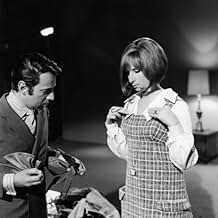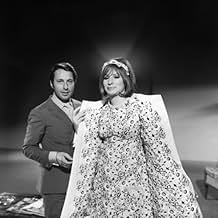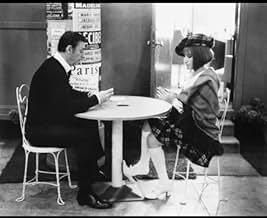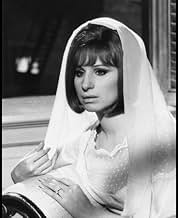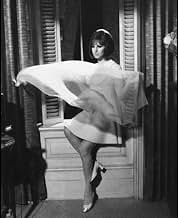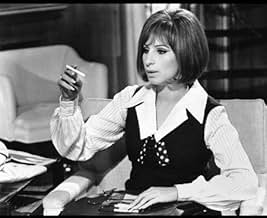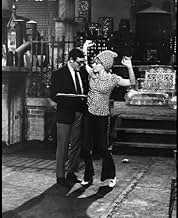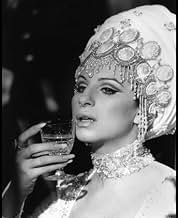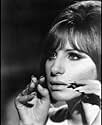IMDb RATING
6.4/10
4.5K
YOUR RATING
A troubled young woman who visits a psychotherapist to help her quit smoking undergoes hypnosis and finds herself reliving a tragic Victorian romance from a past life.A troubled young woman who visits a psychotherapist to help her quit smoking undergoes hypnosis and finds herself reliving a tragic Victorian romance from a past life.A troubled young woman who visits a psychotherapist to help her quit smoking undergoes hypnosis and finds herself reliving a tragic Victorian romance from a past life.
Featured reviews
This is one of those musicals that rarely gets talked about. Even the original stage version is not as well known as say, "Oklahoma!" or "West Side Story", but it should be. It has some wonderful music and an intriguing story.
However, comparing the stage version of this show with the film would be pointless, because all filmed musicals of Broadway shows usually change in more then a few ways. As for this film, it is a charming watch, and an enjoyable way to spend a couple of hours. You don't need to be fans of either of the lead actors, but it does help if you are a musical fan and are somewhat interested in the science of ESP.
The songs in this film are all great, not one of them are what I would consider "filler". A few of the original songs from the stage show have been replaced here with different pieces, but they are good ones nontheless. My only complaint in them is Yves Montand's singing. It's difficult enough to understand his spoken word, but it's even worst when he sings. John Cullum's singing in the original Broadway version is so clear and strong, and Montand is just not at par with that. Still, the quality of the songs themselves, make up for this. The Technicolor is stupendous, lusch and vivid. It's a shame that the film was cut so badly before it was released. Not having seen that version, it's difficult for me to say whether or not it would have been an improvement over the finished product, but I doubt it. As it is, this is a decent, pleasant musical film, and worth watching if you are a fan of the genre.
However, comparing the stage version of this show with the film would be pointless, because all filmed musicals of Broadway shows usually change in more then a few ways. As for this film, it is a charming watch, and an enjoyable way to spend a couple of hours. You don't need to be fans of either of the lead actors, but it does help if you are a musical fan and are somewhat interested in the science of ESP.
The songs in this film are all great, not one of them are what I would consider "filler". A few of the original songs from the stage show have been replaced here with different pieces, but they are good ones nontheless. My only complaint in them is Yves Montand's singing. It's difficult enough to understand his spoken word, but it's even worst when he sings. John Cullum's singing in the original Broadway version is so clear and strong, and Montand is just not at par with that. Still, the quality of the songs themselves, make up for this. The Technicolor is stupendous, lusch and vivid. It's a shame that the film was cut so badly before it was released. Not having seen that version, it's difficult for me to say whether or not it would have been an improvement over the finished product, but I doubt it. As it is, this is a decent, pleasant musical film, and worth watching if you are a fan of the genre.
Frankly, I think the discussion of this movie will never end. We don't know what director's cut was like...may have been better or worse. The release was just bad timing. and there was no appetite for this in the "movie going" public.
It is a dinosaur.
Streisand was at her best in this film. Montand wasn't awful, just miscast. I recently watched some of his other movie performances, and was left with a question about the appeal that folks had in him to begin with. The music/songs were only brought to life by Streisand....who else could have held your interest in the lyrics? If this had been released before "Hello Dolly" it would have been a hit. Instead, it made Streisand look like a "one-trick-pony".
Director V.Minnelli was the right choice, in my opinion, and any adaption from stage to screen is always risky. Especially with a musical. No matter how you feel about this movie, try to imagine it without her. Who could pull it off? Your answers will thrill me.
I think, all in all, it was just made at the wrong time. When I watch it now, I feel very nostalgic about the past. Yeah! It was cool to have your bedding match your nightgown!
It is a dinosaur.
Streisand was at her best in this film. Montand wasn't awful, just miscast. I recently watched some of his other movie performances, and was left with a question about the appeal that folks had in him to begin with. The music/songs were only brought to life by Streisand....who else could have held your interest in the lyrics? If this had been released before "Hello Dolly" it would have been a hit. Instead, it made Streisand look like a "one-trick-pony".
Director V.Minnelli was the right choice, in my opinion, and any adaption from stage to screen is always risky. Especially with a musical. No matter how you feel about this movie, try to imagine it without her. Who could pull it off? Your answers will thrill me.
I think, all in all, it was just made at the wrong time. When I watch it now, I feel very nostalgic about the past. Yeah! It was cool to have your bedding match your nightgown!
On A Clear Day came at the end of the Movie Musical Cycle that started strong from MY FAIR LADY. Once the market became supersaturated with musicals (Half A Sixpence, Dr. Doolittle), the beauty of the movie musical wore off.
On A Clear Day started life as the next go-round for Richard Rodgers. After he retired working with Oscar Hammerstein, he partnered with Alan Lerner and they started to write this musical. Rodgers backed out of the project but the show made it to Broadway with Barbara Harris in the lead. It was respectfully received but never did blockbuster business. In fact, if it weren't for the song "What Did I Have?" it would almost be forgotten.
Enter Vincente Minelli and Ms. Streisand. Together, they took the idea and ran with it until it became a big, bright, lovely movie. The old songs (the title song and "What Did I Have") are rendered priceless by Barbra who sings them as emotional tour-de-forces. The new songs (a cute duet "Go To Sleep" and "Love With All The Trimmings") are wonderful. In fact, the latter was filmed a la Tom Jones. In short, everything about the film worked.
Originally it was three hours long and intended as a road show production (tickets ordered in advance; two shows a day). Paramount went for the fast buck and they trimmed it to under two hours. Yes, what is left is priceless and wonderful but I wish they would release the Director's Cut of this musical. If what we see today is still excellent, I can't help but wonder about what they took out.
On A Clear Day started life as the next go-round for Richard Rodgers. After he retired working with Oscar Hammerstein, he partnered with Alan Lerner and they started to write this musical. Rodgers backed out of the project but the show made it to Broadway with Barbara Harris in the lead. It was respectfully received but never did blockbuster business. In fact, if it weren't for the song "What Did I Have?" it would almost be forgotten.
Enter Vincente Minelli and Ms. Streisand. Together, they took the idea and ran with it until it became a big, bright, lovely movie. The old songs (the title song and "What Did I Have") are rendered priceless by Barbra who sings them as emotional tour-de-forces. The new songs (a cute duet "Go To Sleep" and "Love With All The Trimmings") are wonderful. In fact, the latter was filmed a la Tom Jones. In short, everything about the film worked.
Originally it was three hours long and intended as a road show production (tickets ordered in advance; two shows a day). Paramount went for the fast buck and they trimmed it to under two hours. Yes, what is left is priceless and wonderful but I wish they would release the Director's Cut of this musical. If what we see today is still excellent, I can't help but wonder about what they took out.
This is one of those films that one would like to praise without reservation, but, alas!, some elements are not quite up to the high level of some of its attributes.
Streisand, after that stunning title montage (Love those blooming flowers and the clever lyrics that coax them into the sunshine!) is a bit grating in her opening scenes as Daisy Gamble, though she mellows somewhat as the modern-day plot progresses. However she more than rises to the occasion when Melinda is exhumed and she gets to parade about in Cecil Beaton's absolutely stunning accoutrements. Montand, who seems to have learned his lines phonetically (A foreign accent can be charming but he seems to be exaggerating his!), is serviceable, sings on key, and manfully wades through the machinations of the scriptwriters, what with the absurd brouhaha over reincarnation among the university's powers-that-be and Dr. Chabot's stubborn reluctance to admit that Daisy has psychic powers, et cetera. John de Cuir does his usual eye-filling wonders with the production design, beautifully aided by Harry Stradling, Sr.'s use of the Panavision/Technicolor cameras. And, of course, Burton Lane's score has a few liltingly listenable songs that propel the story quite felicitously. And there's the bonus of two of my favorite actresses, Mabel Albertson and Irene Handl, to add some sly support. (And, one must reluctantly mention Jack Nicholson, youthfully handsome in his brief appearance here, now a gothic ruin of his former self...Must be all those ill-tempered characters he's since played, as well as the reported off-screen dissipation in the decades since.)
But Nelson Riddle, undeniably one of the all-time great arrangers for singers like Frank Sinatra and Ella Fitzgerald, seems the wrong choice to orchestrate and conduct the musical elements. His work seems a little thin and not equal to the lush visual panoply. And, I suspect, Vincente Minnelli was hampered by the producer, Howard Koch, whose credits suggest a level of taste and achievement more oriented to audiences that preferred something less refined than what might have best suited this enterprise. The direction seems a bit diffuse, and even dispirited, and certainly not up to the standard of Minnelli's best in his halcyon days at Metro-Goldwyn-Mayer.
Nevertheless, I'll admit I enjoyed it when I saw it during its theatrical release, but beware of non-letterboxed video transfers. "Formatting" will reduce this one to considerably less than its makers intentions. If a DVD release comes along and you're a Streisand (or Minnelli) fan, it'll be worth the wait.
Streisand, after that stunning title montage (Love those blooming flowers and the clever lyrics that coax them into the sunshine!) is a bit grating in her opening scenes as Daisy Gamble, though she mellows somewhat as the modern-day plot progresses. However she more than rises to the occasion when Melinda is exhumed and she gets to parade about in Cecil Beaton's absolutely stunning accoutrements. Montand, who seems to have learned his lines phonetically (A foreign accent can be charming but he seems to be exaggerating his!), is serviceable, sings on key, and manfully wades through the machinations of the scriptwriters, what with the absurd brouhaha over reincarnation among the university's powers-that-be and Dr. Chabot's stubborn reluctance to admit that Daisy has psychic powers, et cetera. John de Cuir does his usual eye-filling wonders with the production design, beautifully aided by Harry Stradling, Sr.'s use of the Panavision/Technicolor cameras. And, of course, Burton Lane's score has a few liltingly listenable songs that propel the story quite felicitously. And there's the bonus of two of my favorite actresses, Mabel Albertson and Irene Handl, to add some sly support. (And, one must reluctantly mention Jack Nicholson, youthfully handsome in his brief appearance here, now a gothic ruin of his former self...Must be all those ill-tempered characters he's since played, as well as the reported off-screen dissipation in the decades since.)
But Nelson Riddle, undeniably one of the all-time great arrangers for singers like Frank Sinatra and Ella Fitzgerald, seems the wrong choice to orchestrate and conduct the musical elements. His work seems a little thin and not equal to the lush visual panoply. And, I suspect, Vincente Minnelli was hampered by the producer, Howard Koch, whose credits suggest a level of taste and achievement more oriented to audiences that preferred something less refined than what might have best suited this enterprise. The direction seems a bit diffuse, and even dispirited, and certainly not up to the standard of Minnelli's best in his halcyon days at Metro-Goldwyn-Mayer.
Nevertheless, I'll admit I enjoyed it when I saw it during its theatrical release, but beware of non-letterboxed video transfers. "Formatting" will reduce this one to considerably less than its makers intentions. If a DVD release comes along and you're a Streisand (or Minnelli) fan, it'll be worth the wait.
10Xanadu-2
On A Clear Day improves and is more enjoyable for each viewing. The first time I saw it was such a huge elephant of a movie, a baffling entertaining jumble. So many ideas propped into one movie to make it popular and a box office hit in a time of change and when the big movie companies were desperately seeking hits to save themselves from ruin.
So this movie is crammed when ingredients that had proven successful in earlier movies in the 60´s : Barbra Streisand and a musical score (Funny Girl), gigantic sets and costumes in 19th century style (My Fair Lady), 60´s mod clothing, a big European star for the overseas market (Montand), new young stars (Nicholson) for counterculture hippy flavor, student riots (very 'now' then), reincarnation and telepathy (sci-fi), british accents both snobby and cockney (swinging London)
Barbra is one of the biggest talents of the 20th century and was born a little too late. Those huge musicals she stars so well in where dated then and she would have been better off in the 40s or 50s. She is very beautiful, womanly and sexy when she is in period costume. In the modern scenes she is fascinating and a little annoying when she´s trying to be a kooky 60´s chick à la Twiggy.
Yves Montand is miscast even though he has earthy European charm. He is unbelievable because he cannot pronounce the dialouge!!!!! His diction is a disaster and didn´t do the film any favors. Was there really no other singer for the male lead?
The songs are very good and underrated. Why does one never hear them as other musical classics? The direction from Vincente Minelli works since the film is very lush and enthralling. The period costumes by Cecil Beaton are beautiful without being too much and look great on Babs. The snazzy Scaasi mod clothes are a hoot!
It is very ambitious combinig so many elements and hope it works. Despite it all the film does have charm and one is drawn into 2 hours of pure Hollywood entertainment and at the same time it is fascinating to see one of the very last old time Hollywood productions. (It was already outdated when it was released 1970. Bad timing; the movie must have seemed as ancient as a dinosaur. It was apparently longer. There was supposedly a scene with Babs, Jack and 'Warren' at a disco but it got cut I would LOVE to see the original version!!!!! This is good fun to watch on rainy day forever
So this movie is crammed when ingredients that had proven successful in earlier movies in the 60´s : Barbra Streisand and a musical score (Funny Girl), gigantic sets and costumes in 19th century style (My Fair Lady), 60´s mod clothing, a big European star for the overseas market (Montand), new young stars (Nicholson) for counterculture hippy flavor, student riots (very 'now' then), reincarnation and telepathy (sci-fi), british accents both snobby and cockney (swinging London)
Barbra is one of the biggest talents of the 20th century and was born a little too late. Those huge musicals she stars so well in where dated then and she would have been better off in the 40s or 50s. She is very beautiful, womanly and sexy when she is in period costume. In the modern scenes she is fascinating and a little annoying when she´s trying to be a kooky 60´s chick à la Twiggy.
Yves Montand is miscast even though he has earthy European charm. He is unbelievable because he cannot pronounce the dialouge!!!!! His diction is a disaster and didn´t do the film any favors. Was there really no other singer for the male lead?
The songs are very good and underrated. Why does one never hear them as other musical classics? The direction from Vincente Minelli works since the film is very lush and enthralling. The period costumes by Cecil Beaton are beautiful without being too much and look great on Babs. The snazzy Scaasi mod clothes are a hoot!
It is very ambitious combinig so many elements and hope it works. Despite it all the film does have charm and one is drawn into 2 hours of pure Hollywood entertainment and at the same time it is fascinating to see one of the very last old time Hollywood productions. (It was already outdated when it was released 1970. Bad timing; the movie must have seemed as ancient as a dinosaur. It was apparently longer. There was supposedly a scene with Babs, Jack and 'Warren' at a disco but it got cut I would LOVE to see the original version!!!!! This is good fun to watch on rainy day forever
Did you know
- TriviaAccording to the 1974 biography "Barbra Streisand: The First Decade", this was originally envisioned as a three-hour "road show" extravaganza, and included many sequences of Daisy's other lives (photos of which were printed in some pre-release promotions), but director Vincente Minnelli and the studio felt it would be too long, especially since musicals had already begun to fail at the box office. In addition to all but the briefest of Jack Nicholson's scenes being cut, a musical number sung by him and Streisand, "Who Is There Among Us Who Knows?," was also cut, as well as "Wait Till We're Sixty-Five," a duet between Larry Blyden and Barbra Streisand. Producer Howard W. Koch conducted a search for the deleted footage in 1994, particularly Nicholson's song, which he wanted to showcase during the AFI tribute to the actor. Nothing turned up at Paramount. Koch asked Streisand and Minnelli's widow if they had remnants of the cut footage, but neither did. Koch determined that if the film still exists, it's probably in a mislabelled canister.
- GoofsThe telephone ring in Chabot's office is not a typical Bell company ring, even though the story is supposedly set in New York.
- Quotes
Dr. Marc Chabot: I used to be in love with answers, but since I've known you I'm just as astounded by questions. Answers make you wise, questions make you human.
- ConnectionsFeatured in Paramount Presents (1974)
- How long is On a Clear Day You Can See Forever?Powered by Alexa
Details
- Release date
- Country of origin
- Language
- Also known as
- On a Clear Day You Can See Forever
- Filming locations
- Production company
- See more company credits at IMDbPro
Box office
- Budget
- $10,000,000 (estimated)
- Gross US & Canada
- $14,000,000
- Gross worldwide
- $14,000,000
Contribute to this page
Suggest an edit or add missing content


